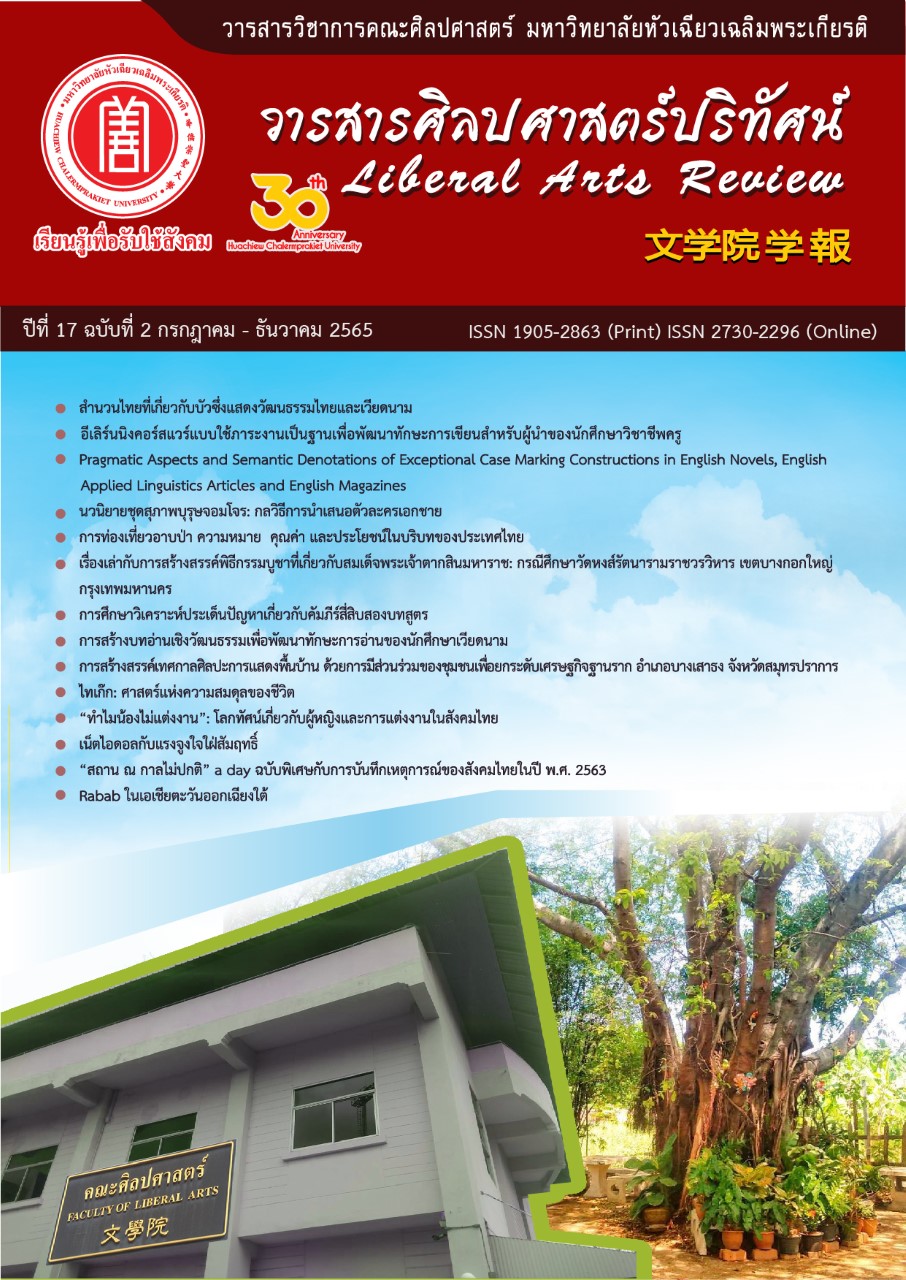Forest Bathing Tourism: Definition, Values, and Benefits in the Context of Thailand
DOI:
https://doi.org/10.14456/lar.2022.15Keywords:
Forest Bathing, Forest Bathing Tourism, Value and Benefit of Forest BathingAbstract
The objectives of this qualitative research were to analyze the definition, value, and benefit of forest bathing in connection with tourism in Thai context. The data were collected firstly, by in-depth interviews with relevant experts. Representatives from government agencies, private sectors, and people with experience in forest bathing activities, totaling 12 people, were interviewed. Then a focus group, convened for a brainstorming meeting with representatives from government agencies, private sectors, and communities who had experience in forest bathing activities including people who were interested in forest bathing for tourism, totaling 53 people, participated in an online meeting. The data were analyzed and grouped in the process of the qualitative method, including synthetic, integrated, and created conclusions in terms of definition, value, and benefit of forest bathing tourism in the Thai context. The research results revealed that 1) the term forest bathing tourism was defined as the main activity based on specific interests or integrated alternative tourism through the safety management process and facilitation for tourists experience, 2) the value of forest bathing was concerned with the economic, social, and environmental impacts linking to the tourism in many dimensions, such as creating a new model/concept of tourism business, creating new tourism route connected to other types of tourism to generate additional income for the community, and 3) the forest bathing benefited both at the individual level, such as the business owners, forest bathing facilitators, and forest bathing participation and while at the community/society level, forest bathing promoted awareness and appreciation of the value of conservation and maintenance of community forest bathing activities.
References
กฤตยา ศรีสรรพกิจ. (2563). เปิดใจให้ธรรมชาติ. กรุงเทพมหานคร: สำนักงานกองทุนสนับสนุนการสร้างเสริมสุขภาพ(สสส.).
ประพจน์ เภตรากาศ และสมหญิง สุนทรวงษ์. (2564). คู่มือป่าบำบัด. กรุงเทพมหานคร: มูลนิธิเพื่อเด็กพิการ.
ยามาโมโตะ ทัตสึทากะ. (2564). โรคขาดธรรมชาติ. กรุงเทพมหานคร: มูลนิธิโกมลคีมทอง.
ริชาร์ด ลุฟว์. (2563). เด็กคนสุดท้ายในป่า เลี้ยงลูกอย่างไรให้ห่างโรคขาดธรรมชาติ. กรุงเทพมหานคร: สวนเงินมีมา.
Airbnb. (2021). Meaningful vacations with family and friends to define Thai travel in 2021. Retrieved from https://news.airbnb.com/th/thai-travel-trends-2021/.
Komppula, R., Konu, H., and Vikman, N. (2017). Listening to the Sounds of Silence: Forest based Wellbeing Tourism in Finland. In Book: Nature Tourism. Editors: Joseph S. Chen and Nina K. Prebensen. Retrieved from https://bit.ly/2Rwuhsh.
Kotte, D., Li, Q., Shin, W. S., and Michalsen, A. (2019). International Handbook of Forest Therapy. Newcastle-upon-Tyne: Cambridge Scholars Publisher.
Li, Q. (2018). Shinrin-Yoku: The Art and Science of Forest-Bathing. London: Penguin Life.
Li, Q., Morimoto, K., Nakadai, A., Inagaki, I., Katsumata, M., Shimizu, T., Hirata, Y., Hirata, K., Suzuki, H., Miyazaki, Y., Kagawa, T., Koyama, Y., Orira, T., Takayama, N., Krensky, A. M., and Kawada, T. (2007). Forest Bathing Enhances Human Natural Killer Activity and Expression of Anti-Cancer Proteins. International Journal of Immunopathology Pharmacology. 20(2Suppl2): 3-8.
Liu, L., Ye, B., Zhang, Z., and Gao, Y. (2019). The Origin and Development of Chinese Forest Therapy. In Book: International Handbooks of Forest Therapy. Editors: Dieter Kotte, Quing Li, Won Sop Shin, and Andreas Michalsen. Cambridge Scholars Publishing.
Markov, S., Steckenbauer, G. C., Pillmayer, M., and Herntrei, M. (2019). Austria: The forest as a tourist landscape (Chapter 4–International Approaches in Forest Therapy). In International Handbook of Forest Therapy. Kotte, D., Ed.; Cambridge Scholars Publishing: Newcastle upon Tyne, UK, 2019.
Miyazaki, Y. (2018). Shinrin-Yoku: The Japanese Way of Forest Bathing for Health and Relaxation. London: Aster.
Ohe, Y., Ikei, G., Song, C., and Miyazaki, Y. (2017). Evaluating the Relaxation Effects of Emerging Forest-Therapy Tourism: A multidisciplinary approach. Tourism Management. 62.
Song, C., Ikei, H., and Miyazaki, Y. (2016). Physiological Effect of Nature Therapy: A review of the research In Japan. International Journal of Environmental Research and Public Health. 13(8).
Downloads
Published
How to Cite
Issue
Section
License
Copyright (c) 2022 Liberal Arts Review

This work is licensed under a Creative Commons Attribution-NonCommercial-NoDerivatives 4.0 International License.
บทความที่ได้รับการตีพิมพ์เป็นลิขสิทธิ์ของวารสารศิลปศาสตร์วิชาการและวิจัย
ข้อความที่ปรากฏในบทความแต่ละเรื่องในวารสารวิชาการเล่มนี้เป็นความคิดเห็นส่วนตัวของผู้เขียนแต่ละท่านไม่เกี่ยวข้องกับมหาวิทยาลัยหัวเฉียวเฉลิมพระเกียรติ และคณาจารย์ท่านอื่นๆ ในมหาวิทยาลัยฯ แต่อย่างใด ความรับผิดชอบองค์ประกอบทั้งหมดของบทความแต่ละเรื่องเป็นของผู้เขียนแต่ละท่าน หากมีความผิดพลาดใดๆ ผู้เขียนแต่ละท่านจะรับผิดชอบบทความของตนเองแต่ผู้เดียว




